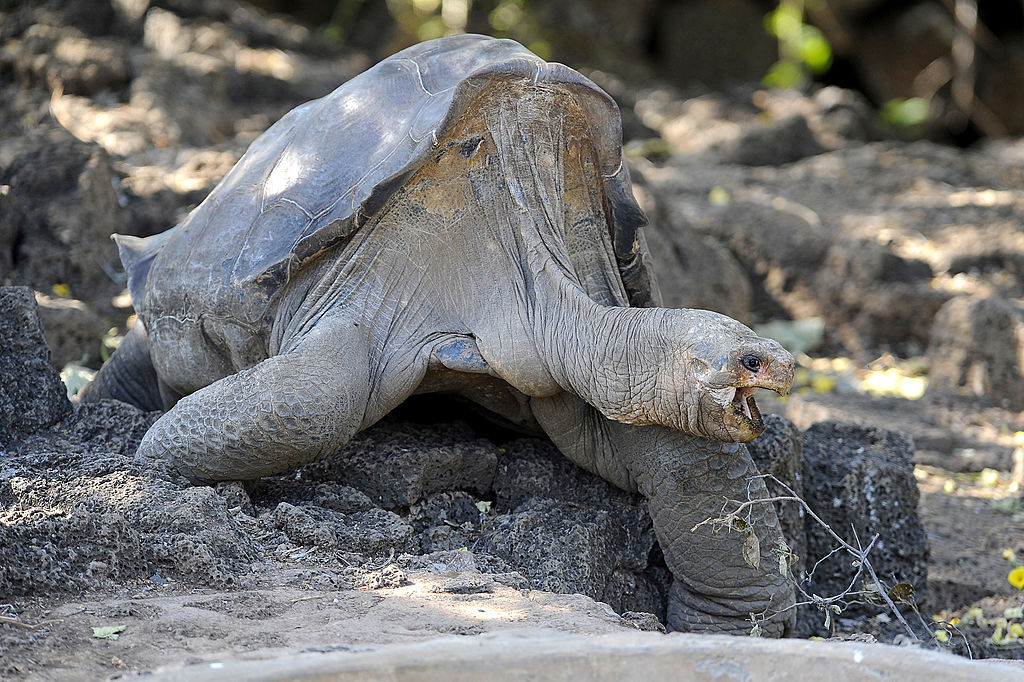Conservationists discover descendants of tortoise species thought to be extinct


A free daily email with the biggest news stories of the day – and the best features from TheWeek.com
You are now subscribed
Your newsletter sign-up was successful
While on an expedition in the Galápagos Islands, conservations made several incredible discoveries — including finding descendants of tortoise species believed to be extinct.
In 2012, a tortoise named Lonesome George, estimated to be about 100 years old, died. He was the last known member of the Chelonoidis abingdonii subspecies, which inhabited Pinta Island. On a recent 10-day journey around the Galápagos Islands, researchers from Galapagos Conservancy found a female tortoise at Isabela Island's Wolf Volcano who is a partial relative of Lonesome George.
This is "a story of hope," Galapagos Conservancy President Johannah Barry told NBC News, adding that her team is "absolutely thrilled" by the discovery. Humans have moved tortoises from different islands, and there could be additional hybrid tortoises with Pinta Island lineage in other areas of the Galápagos.
The Week
Escape your echo chamber. Get the facts behind the news, plus analysis from multiple perspectives.

Sign up for The Week's Free Newsletters
From our morning news briefing to a weekly Good News Newsletter, get the best of The Week delivered directly to your inbox.
From our morning news briefing to a weekly Good News Newsletter, get the best of The Week delivered directly to your inbox.
The researchers also found 18 additional females and 11 male tortoises from Wolf Volcano that are partially related to another species from Floreana Island that was thought to be extinct. They will be taken to a breeding center and evaluated. "I think we are cautiously optimistic that this is a species that we will be able to bring back from extinction and we can repopulate Floreana with tortoises that have significant Floreana linage," Barry said.
A free daily email with the biggest news stories of the day – and the best features from TheWeek.com
Catherine Garcia has worked as a senior writer at The Week since 2014. Her writing and reporting have appeared in Entertainment Weekly, The New York Times, Wirecutter, NBC News and "The Book of Jezebel," among others. She's a graduate of the University of Redlands and the Columbia University Graduate School of Journalism.
-
 The environmental cost of GLP-1s
The environmental cost of GLP-1sThe explainer Producing the drugs is a dirty process
-
 Greenland’s capital becomes ground zero for the country’s diplomatic straits
Greenland’s capital becomes ground zero for the country’s diplomatic straitsIN THE SPOTLIGHT A flurry of new consular activity in Nuuk shows how important Greenland has become to Europeans’ anxiety about American imperialism
-
 ‘This is something that happens all too often’
‘This is something that happens all too often’Instant Opinion Opinion, comment and editorials of the day
-
 Nobody seems surprised Wagner's Prigozhin died under suspicious circumstances
Nobody seems surprised Wagner's Prigozhin died under suspicious circumstancesSpeed Read
-
 Western mountain climbers allegedly left Pakistani porter to die on K2
Western mountain climbers allegedly left Pakistani porter to die on K2Speed Read
-
 'Circular saw blades' divide controversial Rio Grande buoys installed by Texas governor
'Circular saw blades' divide controversial Rio Grande buoys installed by Texas governorSpeed Read
-
 Los Angeles city workers stage 1-day walkout over labor conditions
Los Angeles city workers stage 1-day walkout over labor conditionsSpeed Read
-
 Mega Millions jackpot climbs to an estimated $1.55 billion
Mega Millions jackpot climbs to an estimated $1.55 billionSpeed Read
-
 Bangladesh dealing with worst dengue fever outbreak on record
Bangladesh dealing with worst dengue fever outbreak on recordSpeed Read
-
 Glacial outburst flooding in Juneau destroys homes
Glacial outburst flooding in Juneau destroys homesSpeed Read
-
 Scotland seeking 'monster hunters' to search for fabled Loch Ness creature
Scotland seeking 'monster hunters' to search for fabled Loch Ness creatureSpeed Read
